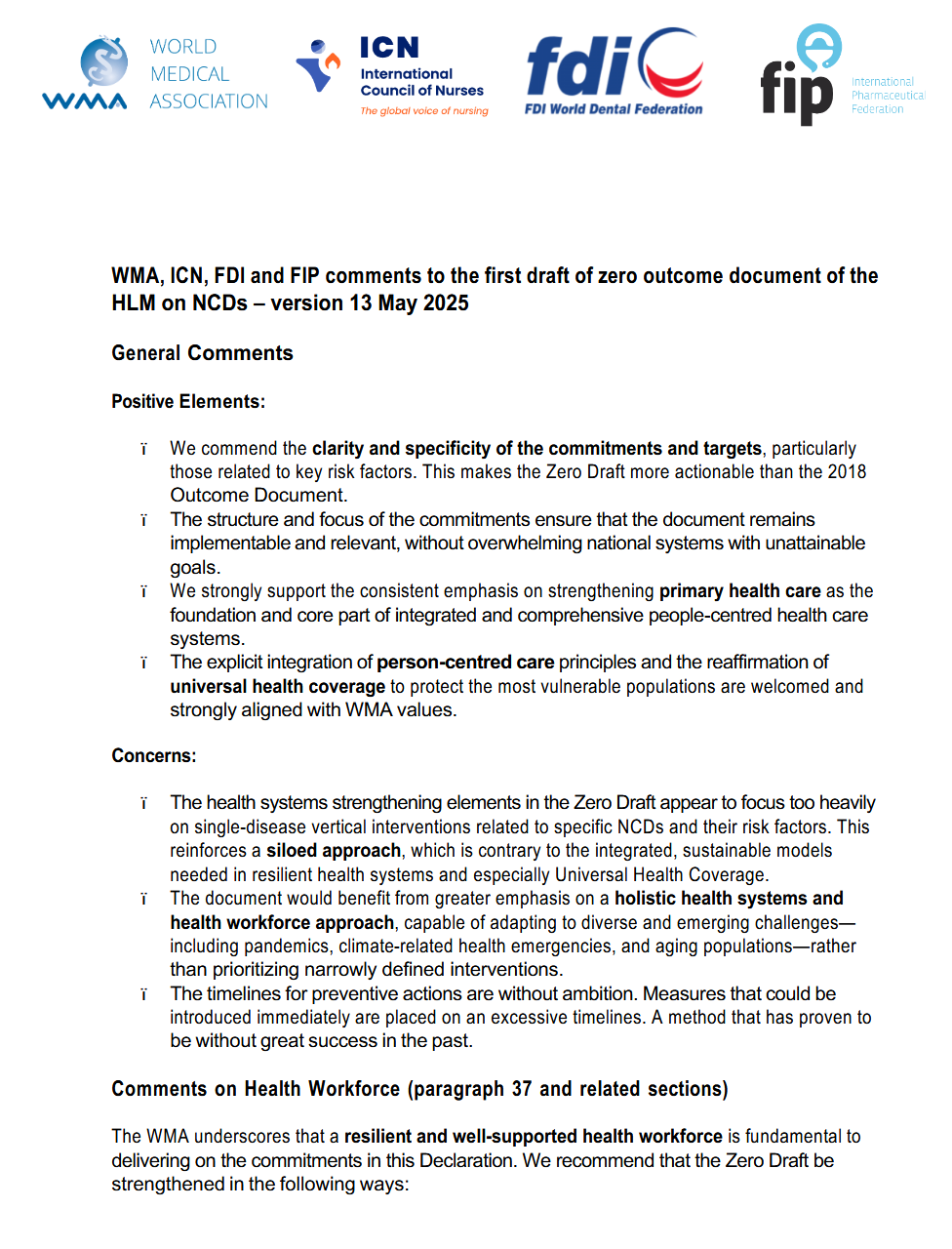Comment to the first draft of zero outcome document of the HLM on NCD – version 13.5.2025
General Comments
Positive Elements:
- We commend the clarity and specificity of the commitments and targets, particularly those related to key risk factors. This makes the Zero Draft more actionable than the 2018 Outcome Document.
- The structure and focus of the commitments ensure that the document remains implementable and relevant, without overwhelming national systems with unattainable goals.
- We strongly support the consistent emphasis on strengthening primary health care as the foundation and core part of integrated and comprehensive people-centred health care systems,.
- The explicit integration of person-centred care principles and the reaffirmation of universal health coverage to protect the most vulnerable populations are welcomed and strongly aligned with WMA values.
Concerns:
- The health systems strengthening elements in the Zero Draft appear to focus too heavily on single-disease vertical interventions related to specific NCDs and their risk factors. This reinforces a siloed approach, which is contrary to the integrated, sustainable models needed in resilient health systems and especially Universal Health Coverage.
- The document would benefit from greater emphasis on a holistic health systems and health workforce approach, capable of adapting to diverse and emerging challenges—including pandemics, climate-related health emergencies, and aging populations—rather than prioritizing narrowly defined interventions.
- The timelines for preventive actions are without ambition. Measures that could be introduced immediately are placed on an excessive timelines. A method that has proven to be without great success in the past.
Comments on Health Workforce (paragraph 37 and related sections)
The WMA underscores that a resilient and well-supported health workforce is fundamental to delivering on the commitments in this Declaration. We recommend that the Zero Draft be strengthened in the following ways:
- Investment in a qualified health workforce remains among the most underdeveloped components of health service development in many countries. The declaration should acknowledge this critical gap and call for national-level health workforce strategies.
- The WHO estimates a global shortage of 10 to 18 million health workers by 2030, which presents a serious threat to health systems and must be directly addressed in the political declaration.
- All countries must take decisive action to protect, safeguard, expand and optimize the health and care workforce to ensure system functionality and resilience.
- We call for stronger language on the need to protect and invest in the workforce, including physical and mental well-being, occupational safety, and working conditions.
- Strengthening national capacities requires robust investment in the training, development, recruitment and retention of a competent, skilled, and adequately equipped health workforce.
- A well-supported health workforce not only improves service delivery, but also drives broader socio-economic benefits, including poverty reduction and reduced inequality through decent employment.
Recommended Addition to Paragraph 37 (in bold new edits):
We support the intent of paragraph 37, and recommend the following revision:
“Increase the number, capacity, retention, and competencies of trained health care workers to implement integrated primary care services for prevention, screening, diagnosis, treatment, rehabilitation and palliative care for people living with one or several noncommunicable diseases and mental health conditions, while improving working conditions and ensuring workplace safety, providing fair remuneration, and promoting continued education and life-long learning to strengthen workforce sustainability and performance.”
Recommended Revision to Related Target (in bold new edits):
We also recommend amending the related health system target to include sufficient staffing:
“At least 80% of public primary health care facilities in all countries have uninterrupted availability of at least 80% of World Health Organization-recommended essential medicines and basic technologies for noncommunicable diseases and mental health conditions at ^affordable prices, and are staffed with a sufficient number of educated health care professionals to deliver integrated quality services for prevention, screening, diagnosis, treatment, rehabilitation, and palliative care by 2030.”
We appreciate the opportunity to contribute to this critical process and stand ready to support continued efforts to advance integrated, equitable, and person-centred approaches to NCDs and mental health.
The World Medical Association (WMA) is the global federation of National Medical Associations representing the millions of physicians worldwide. Acting on behalf of patients and physicians, the WMA endeavours to achieve the highest possible standards of medical care, ethics, education and health-related human rights for all people.
